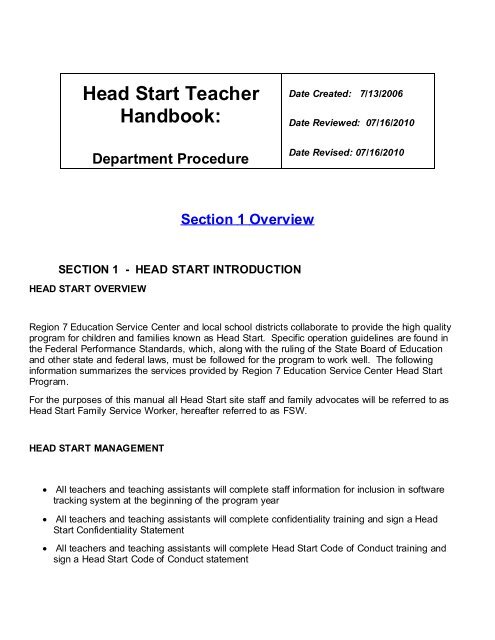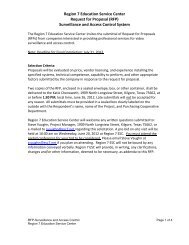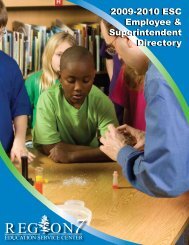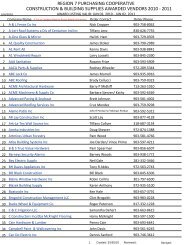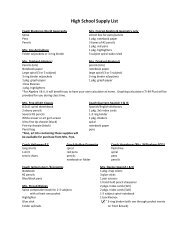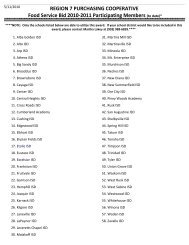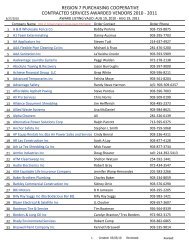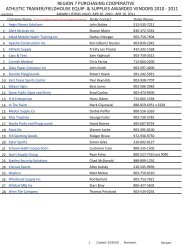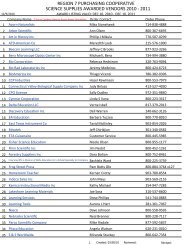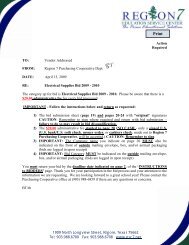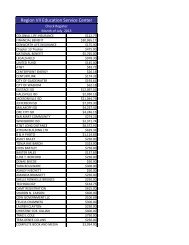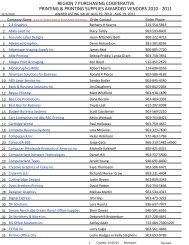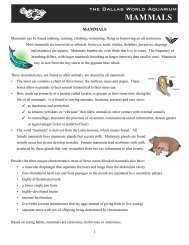Head Start Teacher Handbook: - Region VII Education Service Center
Head Start Teacher Handbook: - Region VII Education Service Center
Head Start Teacher Handbook: - Region VII Education Service Center
Create successful ePaper yourself
Turn your PDF publications into a flip-book with our unique Google optimized e-Paper software.
<strong>Head</strong> <strong>Start</strong> <strong>Teacher</strong><br />
<strong>Handbook</strong>:<br />
Department Procedure<br />
Date Created: 7/13/2006<br />
Date Reviewed: 07/16/2010<br />
Date Revised: 07/16/2010<br />
Section 1 Overview<br />
SECTION 1 - HEAD START INTRODUCTION<br />
HEAD START OVERVIEW<br />
<strong>Region</strong> 7 <strong>Education</strong> <strong>Service</strong> <strong>Center</strong> and local school districts collaborate to provide the high quality<br />
program for children and families known as <strong>Head</strong> <strong>Start</strong>. Specific operation guidelines are found in<br />
the Federal Performance Standards, which, along with the ruling of the State Board of <strong>Education</strong><br />
and other state and federal laws, must be followed for the program to work well. The following<br />
information summarizes the services provided by <strong>Region</strong> 7 <strong>Education</strong> <strong>Service</strong> <strong>Center</strong> <strong>Head</strong> <strong>Start</strong><br />
Program.<br />
For the purposes of this manual all <strong>Head</strong> <strong>Start</strong> site staff and family advocates will be referred to as<br />
<strong>Head</strong> <strong>Start</strong> Family <strong>Service</strong> Worker, hereafter referred to as FSW.<br />
HEAD START MANAGEMENT<br />
<br />
All teachers and teaching assistants will complete staff information for inclusion in software<br />
tracking system at the beginning of the program year<br />
<br />
<br />
All teachers and teaching assistants will complete confidentiality training and sign a <strong>Head</strong><br />
<strong>Start</strong> Confidentiality Statement<br />
All teachers and teaching assistants will complete <strong>Head</strong> <strong>Start</strong> Code of Conduct training and<br />
sign a <strong>Head</strong> <strong>Start</strong> Code of Conduct statement
All teachers will have an assigned <strong>Education</strong> and Mental Health/Disabilities staff assigned to<br />
their classroom<br />
<strong>Teacher</strong>s should contact the assigned <strong>Education</strong> staff when issues, questions or concerns<br />
arise for further clarification<br />
<strong>Teacher</strong>s may submit a form for reimbursement for travel incurred for home visits of <strong>Head</strong><br />
<strong>Start</strong> children, and for other pre-approved <strong>Head</strong> <strong>Start</strong> trainings. Forms submitted for<br />
reimbursement must:<br />
1) Have original signatures<br />
2) Be received in the <strong>Head</strong> <strong>Start</strong> administration office on or before the last business day of<br />
each month<br />
<strong>Head</strong> <strong>Start</strong> regulations require teachers and teaching assistants to have:<br />
<br />
<br />
<br />
an initial physical exam<br />
TB screen<br />
Criminal background check on file at the <strong>Head</strong> <strong>Start</strong> office<br />
<strong>Region</strong> 7 ESC <strong>Head</strong> <strong>Start</strong> will provide opportunities for this to be completed.<br />
EARLY CHILDHOOD EDUCATION AND DEVELOPMENT<br />
<br />
<br />
<br />
<br />
<br />
<br />
<br />
<br />
<br />
Developmentally appropriate setting for three and four year old children according to NAEYC<br />
standards<br />
Room set up in a learning centers environment; at least 1 hour total of learning centers daily<br />
Outdoor Environment should be treated as an extension of the indoor learning environment.<br />
At least 2 adults in the classroom<br />
Parent and other volunteers encouraged in the classroom<br />
Routine home visits (at least 2 per year by teaching staff)<br />
Routine parent-teacher conferences (at least 2 per year)<br />
Toothbrushing twice daily<br />
Developmental screenings
Ongoing observations and assessment of children’s developmental progress<br />
Individualization<br />
PSD (Performance Standards Documentation)<br />
DISABILITIES<br />
<br />
<br />
<br />
<br />
Participation in the ARD Committee decision<br />
Modifications in the classroom where necessary<br />
Implementation of IEP<br />
Coding of IEP on lesson plans<br />
CHILDHEALTHANDSAFETY<br />
<br />
<br />
<br />
<br />
Children are familiarized through play with all Health <strong>Service</strong>s they will receive prior to the<br />
delivery of those services<br />
Comprehensive medical/dental treatment and follow-up<br />
Health/Safety taught in the classroom<br />
FSW on campuses for family assists<br />
CHILD NUTRITION<br />
<br />
<br />
<br />
<br />
Nutrition training is seen as an integral part of the total education program<br />
Family style meal service<br />
Regular nutrition activities in the classroom<br />
Nutritionist is available for consultation for parents, children, and teachers<br />
MENTAL HEALTH<br />
<br />
Mental Health is seen as both supportive and instructional in the prevention of behavioral
classroom<br />
<br />
Mental Health is seen as both supportive and instructional in the prevention of behavioral<br />
difficulties in the classroom<br />
Mental Health Staff are available for observations and/or consultations<br />
FAMILY & COMMUNITY PARTNERSHIP/PARENT INVOLVEMENT<br />
<br />
<br />
<br />
<br />
<br />
<br />
<br />
Monthly parent trainings are held<br />
<strong>Region</strong> 7 Policy Council is comprised of at least 51% parents<br />
Volunteering in the classroom is encouraged<br />
Parents are welcomed in the classroom<br />
Parent Bulletin Board<br />
FSW on each campus to assist parents with social services needs such as food, shelter,<br />
clothing, education, training, etc.<br />
Child care available for parent trainings<br />
PROGRAM GUIDANCE<br />
<br />
<br />
<br />
<strong>Region</strong> ESC partners with local district to establish program<br />
<strong>Head</strong><strong>Start</strong>fundscometo<strong>Region</strong>7ESCandaredisbursedtodistrictsbasedonbudget<br />
allocations and district agreement<br />
Each district has a contact person to handle local concerns, and <strong>Head</strong> <strong>Start</strong> Director and<br />
Assistant Directors are available at <strong>Region</strong> 7 ESC <strong>Head</strong> <strong>Start</strong> Offices<br />
FAMILY SERVICE WORKERS<br />
<br />
<br />
<br />
FSW are assigned for each campus and are responsible for <strong>Head</strong> <strong>Start</strong> enrollment, health<br />
and dental screenings, parent meetings, and services to families. They also ensure that<br />
children receive needed health and dental follow-ups.<br />
FSW’s are available to help with the social services needs of families. If you know of a family<br />
need, talk to your FSW.<br />
FSW’s function as a part of the campus team and occasionally step in to assist in a
if needed<br />
FSW’s function as a part of the campus team and occasionally step in to assist in a<br />
classroom if needed<br />
1B<br />
ORGANIZATION<br />
1. STATEMENT OF PARTICIPATION<br />
As indicated by the school agreement, in the section referring to Local School District<br />
responsibilities, the District has agreed to maintain compliance of the <strong>Head</strong> <strong>Start</strong> Performance<br />
Standards (HSPS). These standard are mandated by Federal law and must be adhered to when a<br />
program receives funding for <strong>Head</strong> <strong>Start</strong>. School districts have been required to comply with<br />
federal regulations related to Special <strong>Education</strong> and Title programs so this should not be something<br />
totally new.<br />
Many of the <strong>Head</strong> <strong>Start</strong> Performance Standards will be in compliance when requirements of the<br />
Texas <strong>Education</strong> Agency are met. However, <strong>Head</strong> <strong>Start</strong> is a very comprehensive program<br />
designed to meet the needs of both children and families. Therefore, staff will find some differences<br />
related to education and the other required components of <strong>Head</strong> <strong>Start</strong>. Some of the differences<br />
include:<br />
1. A staff/child ration of 2 to 20 for four year old and 2 to 17 for three year old<br />
2. Two home visits and two parent conferences per year<br />
3. Family style dining where at least 2 adults sit with and eat the same food as children while<br />
engaging them in conversation<br />
4. A strong parent involvement program where parental input into curriculum is required and parents<br />
are strongly encouraged to volunteer in the classroom and are welcomed by staff<br />
5. A comprehensive screening program completed within the first 45 calendar days of entering the<br />
program<br />
6. An emphasis on prevention and intervention activities in the curriculum (daily toothbrushing)<br />
7. Health and dental screenings and follow-up interventions<br />
8. Mental Health observations and follow-up interventions<br />
9. Emphasis on meeting nutritional needs (including a daily snack)<br />
<strong>Head</strong> <strong>Start</strong> provides staff and support to help in meeting the requirements. Each component has<br />
available staff to assist teachers and assistants in meeting standards.<br />
The <strong>Head</strong> <strong>Start</strong> program is required to conduct a yearly self-assessment. Every three years the<br />
Federal agency (Administration for Children and Families) which provides <strong>Head</strong> <strong>Start</strong> funding will
monitor the program to determine compliance with the <strong>Head</strong> <strong>Start</strong> Performance Standards and<br />
regulations. Some of the paperwork requested of school district staff is required to help document<br />
compliance. The program is working hard to merge any required documentation with what is<br />
already required by schools and to minimize as much as possible any additional<br />
requirements. Your completion of all required documentation will facilitate the monitoring process<br />
and assure that we meet all requirements. <strong>Head</strong> <strong>Start</strong> has a saying: “If it is not written down, it<br />
didn’t happen.” Thanks for your cooperation in this effort.<br />
<strong>Region</strong> 7 ESC <strong>Head</strong> <strong>Start</strong> and Local <strong>Education</strong> Agencies (Independent School Districts and Child<br />
Care <strong>Center</strong>s) enter into partnership each year to provide <strong>Head</strong> <strong>Start</strong> <strong>Service</strong>s in a 12 county<br />
service area.<br />
For clients, <strong>Region</strong> 7 <strong>Education</strong> <strong>Service</strong> <strong>Center</strong> will coordinate all <strong>Head</strong> <strong>Start</strong> components,<br />
including:<br />
<br />
<br />
<br />
<br />
<br />
<br />
<br />
<br />
Provide training opportunities<br />
complete the annual Program Information Report<br />
facilitate the formation of the <strong>Region</strong> 7 ESC <strong>Head</strong> <strong>Start</strong> Policy Council<br />
provide the necessary information for the Policy Council to be effective<br />
involve the Policy Council in completing the annual Self-Assessment<br />
evaluate project compliance with HSPS and all other <strong>Head</strong> <strong>Start</strong> regulations and policies<br />
provide feedback to teaching staff and principals regarding <strong>Head</strong> <strong>Start</strong> operations on each<br />
campus through regular contact with <strong>Head</strong> <strong>Start</strong> staff<br />
provide each school district a copy of the HSPS<br />
Assume the fiscal responsibility for the <strong>Head</strong> <strong>Start</strong> portion of the project, including:<br />
<br />
<br />
<br />
<br />
<br />
<br />
Purchase developmentally appropriate supplies and materials that may be needed to<br />
supplement those of the ISD<br />
manage funds disbursement<br />
assure fiscal accountability; including property control/inventor<br />
complete all applications, amendments, and expenditure reports<br />
work cooperatively with local school districts and the Policy Council to provide services as<br />
mandated in the HSPS<br />
reimburse school districts/centers for agreed upon improvements to maintain <strong>Head</strong> <strong>Start</strong><br />
Standards<br />
For <strong>Region</strong> 7 ESC <strong>Head</strong> <strong>Start</strong>, clients will:
Employ and supervise teachers with professional credentials in early childhood education as<br />
Pre-K <strong>Head</strong> <strong>Start</strong> teachers<br />
Employ and supervise teacher assistants to work in classrooms located both on elementary<br />
campuses and/or community buildings;<br />
Follow local district personnel policies in employing Pre-K/<strong>Head</strong> <strong>Start</strong> teachers and teacher<br />
assistants<br />
Use other ISD staff and support systems to maintain all <strong>Head</strong> <strong>Start</strong> Performance Standards<br />
Use ISD technology staff as the initial contact for problems and simple repairs for computers<br />
purchased and/or used by <strong>Head</strong> <strong>Start</strong> staff or children<br />
Work cooperatively with <strong>Region</strong> 7 ESC <strong>Head</strong> <strong>Start</strong> and Policy Council to provide <strong>Head</strong> <strong>Start</strong><br />
services as described in the Project’s Application for Funding and in the <strong>Head</strong> <strong>Start</strong><br />
Performance Standards<br />
Ensure all expenditures of <strong>Head</strong> <strong>Start</strong> funds are made only by <strong>Region</strong> 7 ESC <strong>Head</strong> <strong>Start</strong><br />
employees and teachers, and have prior written approval by the <strong>Head</strong> <strong>Start</strong> staff<br />
Cooperate in the repossession or payment of fair market value to the <strong>Region</strong> 7 ESC of any<br />
capital outlay (facilities and/or equipment) upon any event of default by the LEA or upon<br />
termination of the partnership by either party<br />
1C. REGION7ESCHEADSTARTMISSIONSTATEMENT<br />
The mission of <strong>Region</strong> 7 <strong>Education</strong> <strong>Service</strong> <strong>Center</strong> <strong>Head</strong> <strong>Start</strong><br />
Is to empower children and their families<br />
To develop knowledge and skills<br />
To be more successful<br />
Self-sufficient members of the community<br />
By providing high quality, efficient,<br />
Comprehensive services<br />
That meet and exceed the<br />
<strong>Head</strong> <strong>Start</strong> Performance Standards.
<strong>Head</strong> <strong>Start</strong> <strong>Teacher</strong><br />
<strong>Handbook</strong>:<br />
Department Procedure<br />
Date Created: 7/13/2006<br />
Date Reviewed: 07/16/2010<br />
Date Revised: 07/16/2010<br />
Section 2 <strong>Education</strong> and Early Childhood <strong>Service</strong>s<br />
2A Indoor Learning Environment<br />
1. The Classroom Environment<br />
It is expected that the <strong>Head</strong> <strong>Start</strong> classroom environment is supportive, interesting, and<br />
encouraging. <strong>Teacher</strong>s should promote acceptance of diversity and recognize each child as a<br />
unique individual. Training opportunities and ongoing mentoring is provided to <strong>Head</strong> <strong>Start</strong><br />
teachers/teacher assistants. The Classroom Environment will be measured by the <strong>Region</strong> 7 ESC<br />
<strong>Head</strong> <strong>Start</strong> Academic <strong>Service</strong>s team using a tool like: CLASS (Classroom Assessment Scoring<br />
System).<br />
2. Materials<br />
Each classroom has been provided developmentally appropriate materials that provide ethnic,<br />
cultural and gender diversity. Manipulative are also provided for concrete experiences, and need to<br />
be rotated on a regular basis to reflect the interest of the child. Materials should also be changed<br />
regularly as children progress in order to scaffold them to a higher level of learning.<br />
3. Needs Assessment<br />
<strong>Head</strong> <strong>Start</strong> staff will complete an annual needs assessment of furniture, technology, and teacher<br />
resource/curriculum materials provided by <strong>Region</strong> 7 <strong>Head</strong> <strong>Start</strong>.<br />
2B Outdoor Learning Environment<br />
1. Outdoor Environment<br />
Outdoor learning needs to be part of the regular daily schedule, if weather permits. In case of<br />
inclement weather, gross-motor activities should be provided indoors. Opportunities for individual<br />
and small group activities, as well as games that support cognitive and gross motor development<br />
need to be planned, and facilitated by teachers and teacher assistants during outdoor<br />
time. Documentation supporting outdoor learning will be included on the PSD.<br />
2. Outdoor Materials <strong>Head</strong> <strong>Start</strong> provides materials for active play and movement that support
development of gross motor skills. Other materials such as balls, tricycles, sand toys and other<br />
classroom materials may be provided that can be utilized outdoors.<br />
3. Outdoor Storage (See Also Facilities, Materials, Equipment)<br />
1. Routines<br />
2C Daily Schedule<br />
It is expected that teachers provide consistent routines and limits supportive of the ages, attention<br />
spans, abilities, and temperaments of each child. This can be achieved by:<br />
<br />
<br />
<br />
<br />
Havingaconsistent,predictableorderforeachsegmentofthedailyroutineevenisthe<br />
amount of time varies from one day to the next, this will be monitored by your <strong>Education</strong><br />
Specialist.<br />
Completing routine activities the same way each time they occur<br />
Minimizing waiting time between activities<br />
Allowing enough time for routines and transitions so they are unhurried and purposeful<br />
2. Schedules<br />
<strong>Teacher</strong>s post daily schedules in the classroom (this includes a picture schedule for child use as<br />
well as a written schedule). This schedule must include opportunities for quiet and active play,<br />
teacher and child directed activities, indoor and outdoor times, music and movement time,<br />
opportunities for bodily care, oral health, meal times and rest times.<br />
3. Transitions<br />
Purposeful transitions give notice to children and prepare them for changes from one activity to<br />
another. Within the daily routine, transitions need to be:<br />
<br />
<br />
<br />
<br />
<br />
Documented on the PSD<br />
Planned and timely<br />
Predictable<br />
Compatible/consistent with the child’s needs<br />
Varied, to maintain interest<br />
4. Small Group Time<br />
Small group time is an ideal time for teachers to assess children. Working with small groups of<br />
children targets specific needs and provides individualized support. <strong>Teacher</strong>s will be provided<br />
small group activities that correlate to the Pre-K guidelines and the <strong>Head</strong> <strong>Start</strong>
Outcomes. <strong>Teacher</strong>s are expected to plan, implement and document instruction based on ongoing<br />
assessment results. See Also: Individualization. See Also: PSD<br />
2D Bodily Care<br />
Toilet training is a developmental milestone. It is reasonable that 3 and 4 year olds may not be fully<br />
potty trained. All adults must assist the child with any associated care. <strong>Teacher</strong>s must notify the<br />
assigned Academic <strong>Service</strong>s staff if a enrolled <strong>Head</strong> <strong>Start</strong> child is not fully toilet trained and wears<br />
diapers while at school. <strong>Head</strong> <strong>Start</strong> will provide diapers for the child while the child is attending<br />
school. However, if a parent chooses to use pull-ups (instead of diapers), they must provide<br />
them. <strong>Teacher</strong>s must notify their FSW when needing additional diapers and/or wipes. Under no<br />
circumstances are parents required to send diapers to school for their child.<br />
2E Parent Contacts<br />
There must be a minimum of four parent contacts per school year, according to <strong>Head</strong> <strong>Start</strong><br />
Performance Standards, two of which are home visits and two being teacher conferences. Any<br />
questions should be directed to the <strong>Education</strong> Specialist. <strong>Head</strong> <strong>Start</strong> will provide each teacher with<br />
developmentally appropriate milestone information (located in <strong>Head</strong> <strong>Start</strong> Beginnings book pg. 97)<br />
to be given and discussed on the first parent contact. See: Parent Contact Form available on-line<br />
for documentation purposes, to be kept in the classroom and reviewed by <strong>Education</strong> Specialist.<br />
2F Parent/<strong>Teacher</strong> Conferences<br />
<strong>Head</strong> <strong>Start</strong> teachers must have a minimum of two parent-teacher conferences per child per school<br />
year. <strong>Teacher</strong>s are responsible for scheduling and conducting the conferences. During these<br />
contacts parental input regarding classroom activities.<br />
<strong>Teacher</strong>s will:<br />
Complete the appropriate Parent Contact form found online.<br />
• Enter the required documentation of the parent conferences in software tracking system for each<br />
child upon completion within the established timelines listed on the <strong>Education</strong> calendar.<br />
2G Home Visits<br />
Home visits are valuable in building respectful relationships with parent/guardians and in developing<br />
broad understanding of every child in the program. Each child’s family must have 2 home visits<br />
during the school year. If the parents refuse to receive visitors at their home, contact your <strong>Education</strong><br />
Specialist.<br />
Purpose is to establish a relationship with the children and their families<br />
<br />
<br />
First home visit should take place within first 45 calendar days of initiation of services<br />
FSW and <strong>Teacher</strong>s conduct home visits as a team. If visits cannot be conducted as a team,<br />
notify the <strong>Education</strong> Specialist
Complete the appropriate Parent Contact form found online and enter in software tracking<br />
system<br />
<strong>Teacher</strong>s may submit a form for reimbursement for travel incurred for home visits of <strong>Head</strong> <strong>Start</strong><br />
children, and for other pre-approved <strong>Head</strong> <strong>Start</strong> trainings.<br />
Forms submitted for reimbursement must:<br />
<br />
<br />
<br />
<br />
<br />
Be submitted on Travel Form 412-Non Employee Travel Reimbursement (online)<br />
Have original signatures<br />
List odometer readings and child's last name (EX: Smith home to Johnson's home)<br />
Must be received in the <strong>Head</strong> <strong>Start</strong> administration office on or before the last business day of<br />
each month<br />
It is highly encouraged for the teachers and site staff to go to home visits together. Work with<br />
site staff to schedule. Discuss safety reasons. Emphasize need for visits to take place in the<br />
home.<br />
1. Establish relationships with families and children<br />
2. Establish trust and rapport<br />
3. Making connections between home and school setting<br />
4. Learning more about parent/child interactions<br />
5. Identifying learning opportunities in home environment<br />
2H Social-Emotional Development<br />
<strong>Teacher</strong>s are trained to use positive discipline techniques. When used appropriately, adults<br />
support children by:<br />
<br />
<br />
<br />
<br />
Sharing control<br />
Focusing on children’s play<br />
Forming authentic relationships<br />
Adopting a problem-solving approach to conflict<br />
Each child’s social-emotional developmental status will be screened within the first 45 days of entry<br />
into <strong>Head</strong> <strong>Start</strong>, using the Self-Help and Social-Emotional Brigance Preschool Screen II.<br />
2I Family Literacy<br />
Family Literacy is a <strong>Head</strong> <strong>Start</strong> initiative. At least one strategy needs to be implemented monthly
(and documented on the PSD).<br />
Suggested ideas are:<br />
<br />
<br />
<br />
<br />
<br />
Take-home literacy bags/books<br />
Encouraging use of lending library in site staff office<br />
Reading events that include parents<br />
Other ISD strategies/initiatives<br />
Picturing America<br />
See Also: Resources<br />
2J Curriculum<br />
1.<br />
2.<br />
3.<br />
4.<br />
5.<br />
6.<br />
7.<br />
8.<br />
District State Adopted curriculum<br />
<strong>Head</strong> <strong>Start</strong> Beginnings<br />
Small Group Activities<br />
Curriculum Plan<br />
Active Learning<br />
Adult/Child Interaction and Positive Discipline<br />
Pre-K Guidelines/<strong>Head</strong> <strong>Start</strong> Child Out Comes<br />
Picturing America<br />
2K On-Going Assessment<br />
Anecdotal notes, COR Rubic, and other checklists. This information is documented with an<br />
assessment instrument that complies with <strong>Head</strong> <strong>Start</strong> requirements and is approved by <strong>Head</strong> <strong>Start</strong><br />
<strong>Education</strong> Staff. <strong>Teacher</strong>s will use this information to plan for meeting individual children’s needs<br />
which are documented on the PSD. Local program child assessment is ongoing and is analyzed<br />
andreportedatleastthreetimesayear. ClassSummaryReportswillbecollected3timesa<br />
year. A calendar with appropriate deadlines will be provided. Assessment documentation must be<br />
kept on file by the teacher.<br />
2L Lesson Plans<br />
<strong>Teacher</strong>s will write weekly lesson plans according to the ISD/<strong>Center</strong> policy. These plans must be<br />
displayed in the classroom. <strong>Head</strong> <strong>Start</strong> lesson plan requirements must be documented on the PSD<br />
and posted with the ISD/<strong>Center</strong> Lesson plans.<br />
2M PSD (Performance Standard Documentation)
The PSD-Performance Standards Documentation form is a supplemental form to be used to show<br />
compliance with lesson plan requirements dictated by the <strong>Head</strong> <strong>Start</strong> Performance Standards. The<br />
PSD must be completed in its entirety monthly and kept with current lesson plans. The completed<br />
PSD is due to your <strong>Region</strong> 7 ESC <strong>Head</strong> <strong>Start</strong> <strong>Education</strong> Specialist by the 5th of each month.<br />
Items on the form include:<br />
<br />
<br />
<br />
<br />
<br />
<br />
<br />
<br />
<br />
<br />
<br />
Daily check of indoor and outdoor learning environment for safety hazards<br />
Individualization/small group activities for children with corresponding Pre-K guidelines<br />
Weekly activities related to:<br />
Healthy habits; activities relating to the child’s physical health and development; examples<br />
might include handwashing, germs, importance of exercise, preparing for hearing and vision<br />
screenings, or importance of sleep<br />
Mental health: activities relating to helping children develop emotional security and facilitating<br />
social relationships; topics might include expressing feelings, developing friendships,<br />
respecting other’s ideas and feelings, or solving conflicts<br />
Nutrition: activities relating to how food contributes to good health, examples might include<br />
selecting healthy foods, trying new foods, eating a variety of foods, participating in foodrelated<br />
activities, or making place mats<br />
Oral hygiene: activities relating to promoting and teaching the importance of effective dental<br />
hygiene; suggested topics might include proper brushing, cavities and tooth decay, parts of<br />
the mouth and ensuring proper mouth hygiene, preparations for dental screenings, or going to<br />
the dentist<br />
Multicultural: activities relating to respecting and promoting the uniqueness of each child and<br />
family while refraining from stereotyping on the basis of gender, race, ethnicity, culture,<br />
religion, or disability; example topics might include how children are alike and different,<br />
individuality, how children celebrate holidays in their families, reading books that reflect<br />
diversity, or families<br />
Gross and fine motor: activities relating to the development of physical control, proficiency,<br />
and strength in both large and small muscles; example topics might include skill development<br />
in throwing and catching, using scissors, putting together puzzles, stringing beads, or writing<br />
and drawing<br />
Outdoor learning: activities in which the teacher provides outdoor implementation of the<br />
curriculum through planned individual and small group experiences; examples might include<br />
classifying nature materials, team building activities and games, or extending the indoor<br />
learning through the use of dramatic play, building, or art materials<br />
<strong>Education</strong>al transitions: activities to move from one activity or part of a day to another that are
tart outcomes; <strong>Education</strong>al examplestransitions: might include activities to move from one activity or part of a day to another that are<br />
transitions planned, purposeful, and can correlate to Pre-K guidelines or <strong>Head</strong> <strong>Start</strong> outcomes; examples<br />
might include clapping syllables of words, alliteration, math skills, or theme related transitions<br />
Self/community safety: activities that promote self-awareness and safety in the school and in<br />
the community; examples might include pedestrian safety, bus safety, emergency evacuations,<br />
personal boundaries, or personal safety such as what to do when a child is lost<br />
<br />
<br />
<br />
Family literacy: activities involving the family that encourage early literacy skills such as print<br />
concept, comprehension, and book appreciation; examples might include family literacy<br />
transition books, activities from Picture America curriculum, family book making activities, or<br />
take home books<br />
Parent input into the curriculum: activities developed and used in the classroom based on<br />
information provided by the families regarding children’s interests and parent goals for their<br />
child<br />
Home School Connection/Special Events (Ex: book bags, home visits, etc.)<br />
2N Individualization<br />
<strong>Teacher</strong>s must individualize instruction for each child based on screening and assessment<br />
data. Individualization and/or small group activities will be recorded on the PSD.<br />
2O Training/Development<br />
<strong>Teacher</strong>s must meet annually with <strong>Region</strong> 7 <strong>Head</strong> <strong>Start</strong> <strong>Education</strong> Specialist to develop goals that<br />
align with their Professional Development Plan.<br />
See Also: Staff Development<br />
2P Field Trips<br />
1.<br />
2.<br />
3.<br />
Each classroom has funding allocated annually per child for activity entrance fees. This<br />
amount is listed in the agreement signed by each ISD/<strong>Center</strong> Superintendent/Administrator.<br />
This funding may be spent only for entrance costs or other participation costs (on site or off<br />
site field trip activity).<br />
The<strong>Region</strong>7ESC<strong>Head</strong><strong>Start</strong>Field Trip Request Form (online) must be submitted to <strong>Head</strong><br />
<strong>Start</strong> <strong>Education</strong> Staff 4 (four) weeks prior to the field trip activity in order to receive approval to<br />
participate and the funding. Indicate on the form whether money is required up front or as a<br />
reimbursement along with documentation of costs (Ex: brochure, print out of online costs,<br />
invoice).<br />
4.<br />
If Funding was requested as a reimbursement a <strong>Region</strong> 7 ESC <strong>Head</strong> <strong>Start</strong> Field Trip<br />
Reimbursement Form (online), a copy of the invoice and the check provided by the district
ubmitted. The If Funding form must was berequested submitted as to your a reimbursement <strong>Education</strong> Specialist a <strong>Region</strong>as 7 soon ESC <strong>Head</strong> as possible <strong>Start</strong> Field following Trip<br />
rpayment. Reimbursement Form (online), a copy of the invoice and the check provided by the district<br />
must also be submitted. The form must be submitted to your <strong>Education</strong> Specialist as soon as<br />
possible following the field trip for payment.<br />
5.<br />
<strong>Teacher</strong>s may request reimbursement for field trip entrance fees only. No financial support is<br />
available for fuel costs for field trips.<br />
6.<br />
7.<br />
FSW must accompany the class to the field trip and is responsible for the supplemental First<br />
Aid Kit.<br />
Contact your <strong>Education</strong> Specialist if assistance is needed on field trips.<br />
Points to Remember:<br />
<br />
<br />
<br />
<br />
2:20 adult:child ratio must be observed during the <strong>Head</strong> <strong>Start</strong> day – field trips are no<br />
exception<br />
<strong>Head</strong> <strong>Start</strong> issued supplemental First Aid Kit hip packs must be carried by the FSW on any<br />
trip away from the school/center<br />
Plan to follow school/center policies on requesting brown bag lunches from school/center food<br />
services<br />
<strong>Head</strong> <strong>Start</strong> children must not be asked to bring money or food from home to participate in<br />
ANY activity, including field trips<br />
2Q Substitutes in <strong>Head</strong> <strong>Start</strong> classrooms<br />
Substitutes are provided in the <strong>Head</strong> <strong>Start</strong> classroom 2 (two) times per year for Home Visits and 2<br />
(two) times per year to attend <strong>Head</strong> <strong>Start</strong> training.<br />
<strong>Head</strong> <strong>Start</strong> teachers will be provided a <strong>Head</strong> <strong>Start</strong> Substitute <strong>Teacher</strong> information packet to<br />
complete and keep with other ISD information readily available. This will include any information<br />
thatasubstituteteacherwillneedtofacilitateasmoothtransitionforthechildrenintheir<br />
care. Examples of this information might include: meal times, locations of equipment, which<br />
playground to play on, evacuation instructions, specific instructions with regard to sanitation, etc.<br />
2R Rest Time<br />
A supervised rest time may be included in the daily schedule of <strong>Head</strong> <strong>Start</strong> classrooms. This is<br />
based on the developmental needs of the children and the ISD/<strong>Center</strong> schedule. Classroom<br />
adult:child ratio is maintained during this time. (See Also: Facilities, Materials and<br />
Equipment: Rest Time equipment).<br />
2S Welcome to CLASS<br />
The Classroom Assessment Scoring System (CLASS) is an observation tool that focuses on the
effectiveness of classroom interactions among teachers and children, because it is these daily<br />
interactions that promote children's social and cognitive development. Children thrive when<br />
teachers create nurturing, well-managed settings and provide frequent and engaging opportunities<br />
to learn.<br />
2T Forms<br />
<strong>Teacher</strong>s can access the following forms on the <strong>Head</strong> <strong>Start</strong> Website:<br />
ESC Forms<br />
<br />
<br />
<br />
<br />
207 Stipend<br />
208 Substitute Reimbursement<br />
412 Non-Employee Travel Reimbursement<br />
413 Pharmacy Authorization<br />
Disability Forms<br />
<br />
<strong>Education</strong>/Disabilities Cover Sheet<br />
Mental Health Forms<br />
<br />
<br />
<br />
Mental Health Cover Sheet<br />
Individual Recommendations/Modifications<br />
<strong>Head</strong> <strong>Start</strong> Provider Sign-in Sheet<br />
<strong>Education</strong> Forms<br />
<br />
<br />
<br />
<br />
<br />
<br />
<br />
<br />
<strong>Head</strong> <strong>Start</strong> <strong>Teacher</strong> Training Calendar<br />
30 and 45 Day Deadlines<br />
Daily Schedule<br />
Substitute <strong>Teacher</strong> Information<br />
Pedestrian Safety Activity and Verification Form<br />
Home Visit Reminder- English<br />
Home Visit Reminder- Spanish<br />
Parent <strong>Teacher</strong> Conference Request- English
Parent <strong>Teacher</strong> Conference Request- Spanish<br />
Parent <strong>Teacher</strong> Conference Reminder- English<br />
Parent <strong>Teacher</strong> Conference Reminder- Spanish<br />
Parent Contact 1-4<br />
Lesson Plans pg.2<br />
Lesson Plans pg.3<br />
PSD Standards Documentation<br />
PSD Sample<br />
<strong>Teacher</strong> Professional Development Request<br />
FieldTripRequest<br />
FieldTripReimbursement<br />
<strong>Teacher</strong> Summer Contact Information
<strong>Head</strong> <strong>Start</strong> <strong>Teacher</strong><br />
<strong>Handbook</strong>:<br />
Department Procedure<br />
Date Created: 07/13/2006<br />
Date Reviewed: 07/16/2010<br />
Date Revised: 07/16/2010<br />
SECTION 3 DISABILITY SERVICES<br />
3A Disability Overview<br />
<strong>Region</strong> 7 ESC <strong>Head</strong> <strong>Start</strong> teachers will ensure that all children with suspected disabilities are<br />
referred appropriately to determine eligibility for disability services. <strong>Teacher</strong>s must ensure<br />
individualization of appropriate objectives from the eligible child’s Individualized <strong>Education</strong> Plan<br />
(IEP); monitor progress, and participate in transition planning.<br />
1. Referral Procedure<br />
a. Referrals to <strong>Head</strong> <strong>Start</strong> Disabilities Staff:<br />
<br />
<br />
Complete the online Disability Referral in the software tracking system to request a<br />
consultation visit from disabilities staff<br />
E-mail the disabilities coordinator to notify her that a referral has been submitted<br />
b. Referrals to ISD:<br />
<br />
Follow the referral process established by the school district in which you work<br />
c. Response to Intervention (RtI)<br />
<br />
Notify the disabilities coordinator by email that a child is being served through the RtI process<br />
Note: <strong>Head</strong> <strong>Start</strong> Disability Staff are available to observe, assist with required classroom<br />
modifications, and provide supportive information and materials to <strong>Head</strong> <strong>Start</strong> teachers for children<br />
with disabilities.<br />
2. Transition<br />
a. ARD/IEP meetings:
Notify the disability staff member for your color team by phone call or e-mail if an ARD<br />
meeting has been scheduled for a child in your class, and include the date, time and location<br />
of the meeting if available<br />
Participate in the ARD meeting as a member representing general education instruction and<br />
be prepared to share the child’s progress to help plan the educational programming for that<br />
child for the current and/or next IEP year<br />
3. Documentation<br />
a. ARD/IEP paperwork<br />
<br />
<br />
Provide a copy of the child’s ARD/IEP paperwork to the FSW to place in the<br />
<strong>Education</strong>/Disabilities section of the child’s file upon receiving the teacher copy after ARD<br />
meeting<br />
Contact a <strong>Head</strong> <strong>Start</strong> disabilities staff member by phone or e-mail if you have difficulty<br />
obtaining ARD/IEP paperwork in a timely manner<br />
NOTE: the updated ARD/IEP paperwork will serve as annual progress documentation for the child,<br />
therefore progress reports will not be collected and filed each grading period as done previously.<br />
b. Individualization<br />
<br />
Use information in the child’s IEP to plan appropriately for instructional modifications and<br />
individualization<br />
<br />
<br />
Documentation of the individualization plans should be included on the PSD<br />
Make accommodations in the learning environment for children based on individual<br />
need. Examples include: preferential seating, extra time for completing assignments,<br />
rearrangement of furniture, etc.
<strong>Head</strong> <strong>Start</strong> <strong>Teacher</strong><br />
<strong>Handbook</strong>:<br />
Department Procedure<br />
Date Created: 07/13/2006<br />
Date Reviewed: 07/15/2010<br />
Date Revised: 07/15/2010<br />
SECTION 4 MENTAL HEALTH SERVICES<br />
4A Mental Health Overview<br />
<br />
<br />
Mental Health is seen as both supportive and instructional in the prevention of behavioral<br />
difficulties in the classroom<br />
Mental Health Staff are available for observations and/or consultations<br />
4B Referral<br />
<br />
<br />
A Mental Health referral is to be submitted when a teacher has concerns regarding an<br />
individual child. These concerns may be behavioral or emotional in nature<br />
FSW’s are to complete a Mental Health referral only when a parent/guardian has made a<br />
request directly to them<br />
• See Also: Automatic Referrals<br />
<strong>Teacher</strong>s should refrain from making a referral until after a child has had adequate time to adjust to<br />
the classroom environment. An adequate amount of time for allowing a child to adjust is typically 4-6<br />
weeks. If you have concerns about a child and the situation does not fall within the Automatic<br />
Referral guidelines and it is prior to 4-6 weeks of the beginning of school, please contact the Mental<br />
Health Coordinator for further direction.<br />
Completing the Referral:<br />
<br />
<br />
The teacher should complete the referral in the Tracking Software System (See Also: Mental<br />
Health Referral Instructions)<br />
The teacher will send an email to the Mental Health Coordinator as notification that a referral<br />
has been submitted. <strong>Teacher</strong> needs to include his or her name and school name in the email.<br />
4C Automatic Referrals
Certain situations require an automatic referral. These situations include a child who:<br />
<br />
<br />
<br />
<br />
<br />
Has been suspended by the ISD/<strong>Center</strong> or is being sent home regularly by the ISD/<strong>Center</strong><br />
due to behavioral issues<br />
Hasrecentlybeenplacedinfostercare<br />
Is initiating sexual play/behaviors with other children, or masturbating continually after<br />
interventions by school personnel have failed<br />
Is leaving marks on other children through aggressive behaviors (more than one incident) and<br />
interventions by school personnel have failed<br />
Has a parent/guardian that has requested a referral be submitted<br />
See Also: Mental Health Referral Form Genesis Earth<br />
4D DECA (Devereux Early Childhood Assessment)<br />
The Devereux Early Childhood Assessment (DECA) is an assessment that may be used by the<br />
Mental Health staff. Mental Health staff may ask the teacher and/or parent to complete the<br />
assessment. This request might take place either through email, fax or during the site visit.<br />
Completing the Devereux Early Childhood Assessment (DECA):<br />
When you receive the DECA, via e-mail, follow the procedures below to complete and return the<br />
assessment.<br />
<br />
<br />
<br />
<br />
<br />
<br />
<br />
<br />
Open the e-mail with the assessment attached<br />
Double click on the link to the attachment<br />
Save the attachment to your computer (remember where you saved it)<br />
Close the e-mail<br />
Open the Assessment from the location that you saved it to on your computer<br />
Complete the assessment fully<br />
Save the changes you made<br />
Attach the completed DECA to an email and send back to your assigned <strong>Head</strong> <strong>Start</strong> Mental<br />
Health Staff<br />
4E. Observation<br />
Mental Health staff will complete an observation of a child of concern. After the observation has
een completed, the Mental Health staff may provide classroom recommendations/interventions for<br />
the teacher in writing. After a completed observation, Mental Health staff will determine if further<br />
referral is needed: play therapy, psychological evaluation, psychiatric evaluation, etc.<br />
Mental Health staff will return for a follow-up observation to determine if recommendations have<br />
been implemented and if the child has made progress. Additional recommendations may be<br />
provided again in writing at follow-up visits. A copy of any written recommendations will be filed in<br />
the child’s folder under the Mental Health section.<br />
4F. Consultation and Follow-Up<br />
Mental Health staff will:<br />
<br />
<br />
<br />
<br />
<br />
<br />
<br />
Complete consultations with parents/guardians regarding children and/or family concerns<br />
Provide recommendations/interventions for parents/guardians that can be used in the home<br />
environment. If the Mental Health staff has determined that an outside referral is needed, the<br />
staff will discuss this process with parents/guardians at this time.<br />
Continue to consult with parents/guardians throughout the program year regarding referral<br />
Consult with contracted providers regarding the reason for the initial referral<br />
Consult with the contracted provider throughout the program year to determine progress<br />
Consult with ISD administration when needed to help determine the needs of the referral<br />
Continue to make follow-up visits to the ISD’s throughout the program year. These<br />
observations will consist of assessing the effectiveness of initial<br />
recommendations/interventions. When needed, the staff will provide further<br />
recommendations/interventions to assist with the referral.<br />
4G. Mental Health Topics/<strong>Education</strong><br />
Mental Health materials may be provided for the classroom if a need is determined by the Mental<br />
Health staff. These materials are checked out to the teachers and will be collected at the end of the<br />
school year.<br />
Mental Health staff have provided a Lending Library notebook at every HS/EHS site/center. This<br />
notebook is intended to be used for educational purposes for parents, teachers and HS/EHS staff.<br />
4H. Mental Health Providers<br />
HS/EHS contracts with outside providers each year to provide services to <strong>Head</strong> <strong>Start</strong> and Early<br />
<strong>Head</strong> <strong>Start</strong> enrolled children. These providers may provide the following services, either on or offsite:<br />
Play Therapy, Psychological Evaluation, Psychiatric Evaluation, and/ or recommendation for<br />
parenting classes.<br />
These providers are to complete contact notes regarding each counseling session or contact with
parent/guardian. These notes will include information regarding what has taken place during the<br />
counseling session, possible recommendations for the classroom and possible recommendations<br />
for the home, and will be filed in the child’s folder under the Mental Health section. It is<br />
recommended that the teacher read over these notes on a regular basis to help determine child’s<br />
individual needs.
<strong>Head</strong> <strong>Start</strong> <strong>Teacher</strong><br />
<strong>Handbook</strong>:<br />
Department Procedure<br />
Date Created: 07/13/2006<br />
Date Reviewed: 07/15/2010<br />
Date Revised: 07/15/2010<br />
Section 5 Health <strong>Service</strong>s<br />
5A Child Abuse<br />
All teachers must be trained annually in recognizing and reporting child abuse. <strong>Teacher</strong>s who<br />
receive this training through their district must provide documentation and must follow the Texas<br />
State law regarding suspected child abuse. <strong>Teacher</strong>s who do not have access to district<br />
sponsored Child Abuse training may request a Child Abuse training module from <strong>Head</strong> <strong>Start</strong><br />
staff. <strong>Teacher</strong>s may find the Child Abuse Hotline Number in the Emergency Flip Chart provided to<br />
each classroom or at www.childabuse.com<br />
5B Communication<br />
<strong>Head</strong> <strong>Start</strong> teachers conduct daily observation of all children in their care. Any concerns or<br />
exceptions to the normal routine/health are documented in the PSD. <strong>Teacher</strong>s must communicate<br />
new or recurring health issues to the school nurse/health designee. Any concerns or comments<br />
about the child’s health that are expressed by the parent to the teacher should be monitored and<br />
reported by the teacher to the school nurse/health designee for a proper referral for medical or<br />
dental treatment.<br />
5C Confidentiality<br />
All health related information about <strong>Head</strong> <strong>Start</strong> enrolled children is strictly confidential, and must be<br />
kept in a secured location within the classroom. Discussions involving information about the child<br />
should be done in private with the child’s parent/legal guardian and with any staff involved in the<br />
care of the child. Written permission to discuss health information with other persons must be<br />
received from the parent/legal guardian. No discussions regarding health information about a child<br />
should take place in front of other children and/or parents. (See Also: Confidentiality Statement)<br />
5D Exclusion Policy<br />
Short Term Exclusion<br />
For short term exclusion in the ISD setting, each teacher must follow the ISD policy. When a child
displays symptoms of a communicable disease at school, the teacher’s responsibility is to send the<br />
child to the school nurse;health designee and follow the ISD’s procedure for possible exclusion. For<br />
short term exclusion in the child care center setting, each teacher must follow the TDFPS Minimum<br />
Standards requirements for short term exclusion. When a child displays symptoms of a<br />
communicable disease at school, the teacher’s responsibility is to send the child to the health<br />
designee and follow the facility's procedure for possible exclusion.<br />
Long Term Exclusion<br />
Children cannot be excluded from long term classroom participation based solely on health care<br />
needs or health/medication requirements unless reasonable accommodations cannot be made to<br />
reduce the health or safety risk to that child or others without fundamentally altering the nature of the<br />
program.<br />
5E Medication Administration Policy<br />
School nurses/designee will provide training on:<br />
<br />
<br />
<br />
(1)Medication administration for <strong>Head</strong> <strong>Start</strong> teachers and other staff or faculty responsible for<br />
a child with a special health/medication need and (2) side effects of medication for children in<br />
their care. This training wil be provided by HS/EHS team nurse if no school nurse/designee is<br />
available.<br />
No over-the-counter medications will be allowed in the <strong>Head</strong> <strong>Start</strong> classrooms<br />
FSW are not allowed to store or administer medication for <strong>Head</strong> <strong>Start</strong> children- no<br />
exceptions<br />
5F Emergency Procedures Flip Chart<br />
<br />
<br />
<br />
<br />
<strong>Teacher</strong>s and teaching assistants in the <strong>Head</strong> <strong>Start</strong> classroom must be familiar with the<br />
contents of the Emergency Procedures Flip Chart<br />
<strong>Teacher</strong>s shall post this flip chart in an easily accessible location close to the classroom door<br />
<strong>Teacher</strong>s shall take this emergency flip chart during any emergency evacuation drills (tornado,<br />
fire, bomb, etc), emergency situations and/or field trips<br />
FSW are responsible for ensuring up to date child roster information is included in the<br />
Emergency Procedures Flip Chart<br />
5G Health Condition and Emergencies<br />
An Emergency Action Plan will be written to specify care for each child in the <strong>Head</strong> <strong>Start</strong> program<br />
with a special health care need or condition that could cause a life threatening<br />
emergency. <strong>Teacher</strong>s will receive a Health Communication for <strong>Teacher</strong>s form for students with<br />
conditions that do not cause life threatening emergencies. A drug information sheet will be attached
if applicable. These forms are to be placed in the flip chart along with EAP's. Emergency plans will<br />
be located in the classroom Emergency Procedures Flip chart.<br />
<strong>Teacher</strong>s are to be familiar with each child’s condition and must be trained by the school nurse<br />
(designee) or <strong>Head</strong> <strong>Start</strong> health staff on what to do in case of an emergency.<br />
The teacher is responsible for familiarizing classroom aides with the emergency procedures and<br />
will direct the aide to inform substitutes of the location of the Emergency Procedures Flip Chart, the<br />
supplemental first aid kit, andthesubstitute information packet.<br />
The school nurse or <strong>Head</strong> <strong>Start</strong> health staff will update the emergency action plans and provide<br />
additional training as needed.<br />
Information about each child’s medical and dental history, special health conditions, disabilities and<br />
allergies is located in the child’s health record in the child information tracking software, and in their<br />
folder on the "Student Medical Conditions" form.<br />
The teacher is responsible to inform the school nurse/health designee of any new or recurring health<br />
conditions so that proper referrals for medical or dental treatment can be made.<br />
5H Emergency Contact Information<br />
FSW staff are responsible for maintaining current emergency contact information (class roster) in<br />
the Emergency Procedures Flip Chart.<br />
5I First Aid Kit Information<br />
First Aid Administration:<br />
The school nurse or school/facility designee has the primary responsibility to administer first<br />
aid. The school or center is responsible for supplying and maintaining their first aid supplies.<br />
<strong>Head</strong> <strong>Start</strong> Issued First Aid Kits:<br />
These are provided for each classroom at the beginning of each program year. <strong>Head</strong> <strong>Start</strong> issued<br />
first aid supplies must be available on outings away from the site. The teacher will determine if the<br />
first aid kit is needed on the playground, based on the size of the campus, proximity to the school<br />
nurse/designee/center office, or other factors. Contents of the kits are determined by the <strong>Head</strong><br />
<strong>Start</strong> Administration, approved by the <strong>Region</strong> 7 ESC <strong>Head</strong> <strong>Start</strong> Health <strong>Service</strong>s Advisory<br />
Committee. Only the items on the approved First Aid Contents list are to be included in the first aid<br />
kit. <strong>Teacher</strong>s will be trained in the use of the first aid items in the <strong>Head</strong> <strong>Start</strong> issued first aid kits.<br />
Storage:<br />
The <strong>Head</strong> <strong>Start</strong> issued first aid kit must be readily available, known to other teachers, assistants,<br />
and substitutes, and must be kept inaccessible to children. A sign will be available to indicate the<br />
location.<br />
Restocking:<br />
The <strong>Head</strong> <strong>Start</strong> issued first aid kit is inventoried and amply stocked at the beginning of each
program year. When additional supplies are needed, the teacher is to submit the First Aid Supply<br />
Request Form to the FSW. Health staff will provide the requested materials. The <strong>Head</strong> <strong>Start</strong><br />
issued first aid kit contents will be inventoried by the <strong>Education</strong> staff during on-site monitoring during<br />
the school year.<br />
5J Dental Supplies<br />
The following supplies will be issued by <strong>Region</strong> 7 ESC <strong>Head</strong> <strong>Start</strong> for each classroom in which<br />
<strong>Head</strong> <strong>Start</strong> children are enrolled.<br />
<br />
<br />
<br />
<br />
<br />
Toothbrushes (3 times yearly)<br />
Toothpaste (beginning of school and upon request)<br />
Gloves (for toothbrushing – beginning of school and upon request)<br />
Cups (for toothbrushing – beginning of school and upon request)<br />
Toothbrush holder and screen (beginning of school and as needed)<br />
<strong>Education</strong> Supplies - (obtain from HS <strong>Education</strong> Staff)<br />
<br />
<br />
Tissues (2 boxes per child per year.)<br />
Diapers and wipes (beginning of school and upon request)<br />
<strong>Head</strong> <strong>Start</strong> issued supplies must only be used for <strong>Head</strong> <strong>Start</strong> children. Supplies must be furnished<br />
by the ISD/facility for Pre-K children in blended classrooms.<br />
<strong>Teacher</strong>s must notify FSW when supplies are low.<br />
5K Gloving Techniques<br />
<br />
<br />
<br />
<strong>Head</strong> <strong>Start</strong> will issue non-latex/non-porous gloves to be used for enrolled <strong>Head</strong> <strong>Start</strong> students<br />
Gloves are to be put on, removed and disposed according to the ISD/<strong>Center</strong> Bloodborne<br />
Pathogens policy<br />
Gloves should be worn for the following procedures (1) toothbrushing/oral health activities (2)<br />
any situation that involved contact with blood or bodily fluids<br />
Care/storage of gloves:<br />
<br />
<br />
<br />
Storeinacool,dryplace(notindirectsunlight)<br />
Heat, light and moisture inactivates the gloves and can cause them to split<br />
Keep out of the reach of the children at all times
Wash hands thoroughly after removing gloves.<br />
See Also: Handwashing<br />
5L Injury Prevention<br />
The ISD/<strong>Center</strong> is responsible for maintaining a safe indoor and outdoor environment. The teacher,<br />
teacher assistant, or other adult(s) supervising children is responsible for following the ISD/<strong>Center</strong><br />
procedures in reporting safety or maintenance issues and for following emergency drills and<br />
procedures<br />
5M Handwashing<br />
<strong>Teacher</strong> shall post <strong>Head</strong> <strong>Start</strong> issued signs at each sink (classroom area) used for handwashing.<br />
All staff, volunteers, and children MUST wash hands with soap and running water for a minimum of<br />
30 seconds (per OSHA) at least at the following times:<br />
ISD/<strong>Center</strong> staff:<br />
<br />
<br />
<br />
<br />
<br />
<br />
<br />
<br />
<br />
<br />
After diapering or toilet use or assisting a child with toilet use<br />
Before food preparation, handling, consumption, or any other food related activity (e.g. setting<br />
the table)<br />
Whenever hands are contaminated with blood or other bodily fluids (even when not-latex/nonporous<br />
gloves are worn)<br />
After removal of non-latex/non-porous gloves<br />
After handling pets or other animals<br />
After cleaning/disinfecting surfaces<br />
Before and after any first aid procedure (non-latex/non-porous gloves should be worn if there<br />
is contact with blood or body fluids)<br />
After assisting children with hygiene activities (wiping noses, etc)<br />
Before and after giving medications<br />
Anytime hands are soiled<br />
Child Care <strong>Center</strong> Staff Only:<br />
In addition to the above items, Minimum Standards for Child Care <strong>Center</strong>s require the following with<br />
regard to handwashing:<br />
<br />
Upon arrival at school/center
After any outdoor activity<br />
After eating, drinking or smoking<br />
After assisting children with oral hygiene activities<br />
Hand sanitizer may not be used as a replacement for handwashing with soap and running water.<br />
5N Diapering/Toileting<br />
<strong>Teacher</strong>s/Teaching Assistants must:<br />
<br />
<br />
<br />
<br />
<br />
<br />
<br />
<br />
<br />
<br />
<br />
Assemble needed materials prior to placing child on the approved diaper changing<br />
surface. Use non-latex/non-porous gloves if handling visibly bloody bodily fluids or according<br />
to ISD/<strong>Center</strong> policy<br />
Never leave the child unattended, even is child is secured with safety strap. Always ensure<br />
that supervision of the remainder of the group is maintained. Maintain privacy of the child as<br />
appropriate<br />
Talk to the child in a positive manner throughout the process. Do not berate him/her for<br />
toileting accidents<br />
Thoroughly cleanse and dry child. Use wipes to clean hands of adult or child if contaminated<br />
during the process<br />
Use only Parent approved products that are labeled with the child's name (lotions, powders,<br />
ointments, etc) Follow ISD/<strong>Center</strong> policies<br />
Place clean diaper on child<br />
Dispose of wipes, paper towels, diapers, gloves in the <strong>Head</strong> <strong>Start</strong> provided covered<br />
container<br />
Wash child’s hands as appropriate for age and ability<br />
Sanitize diaper changing surface before placing another child on it, using product approved<br />
by the ISD/<strong>Center</strong>. Follow ISD/<strong>Center</strong> procedures and instructions on commercially prepared<br />
product<br />
Wash hands with soap and running water and dry with paper towel<br />
Return child to supervised activity
<strong>Head</strong> <strong>Start</strong> <strong>Teacher</strong><br />
<strong>Handbook</strong>:<br />
Department Procedure<br />
Date Created: 07/13/2006<br />
Date Reviewed: 07/15/2010<br />
Date Revised: 07/15/2010<br />
SECTION 6 NUTRITION SERVICES<br />
6A. Nutrition Overview<br />
<strong>Head</strong> <strong>Start</strong>’s child nutrition services assist in meeting each child’s nutrition needs and in<br />
establishing good eating habits that nurture healthy development and promote lifelong well<br />
being. <strong>Region</strong> 7 ESC <strong>Head</strong> <strong>Start</strong> services are intended to supplement and complement those of<br />
the home and community.<br />
<strong>Head</strong> <strong>Start</strong> Nutrition, Family/Community Partnership and FSW staff work with individual families<br />
regarding nutrition through parent trainings, resource materials, nutrition counseling and referral to<br />
community resources.<br />
6B. Nutritional Needs Identified<br />
During the enrollment process, FSW obtains information about the family eating patterns, cultural<br />
preferences, special dietary requirements, lead and hemoglobin/hematocrit. FSW follow<br />
procedures in advising teachers of food allergies and other special needs. This information is to be<br />
kept in a confidential manner or otherwise readily accessible to any adults involved in serving food.<br />
See Also: Allergy Plan<br />
Individualization must take place when there is an identified nutritional need (i.e., food allergy,<br />
special feeding instructions, etc.). These instructions are included on the PSD when applicable.<br />
Heights/Weights<br />
Heights and weights of each <strong>Head</strong> <strong>Start</strong> child are recorded twice yearly by FSW. FSW will<br />
communicate with teachers regarding dates planned for taking heights and weights of the children<br />
twice yearly so that teachers can plan schedules and lesson plans accordingly.<br />
6C. Nutritional <strong>Service</strong>s<br />
HS Nutrition staff work with the ISD/<strong>Center</strong> regarding meal service, which includes breakfast, lunch
and snacks that meet the recommended daily nutritional needs of the children. The location of all<br />
meal services will be determined by the ISD/<strong>Center</strong> and <strong>Head</strong> <strong>Start</strong>.<br />
See Also: Meal <strong>Service</strong><br />
Individualization:<br />
Provisions must be made to serve breakfast to children who arrive after breakfast has been served,<br />
if they have not had breakfast.<br />
The teacher is responsible for ongoing observation and assessment of each child’s food choices<br />
based on individual appetites and preferences. It is important to recognize that healthy children<br />
have individual differences and patterns of growth which affect their appetite. However, teachers<br />
should contact the HS Nutrition Coordinator if there is a concern regarding a child’s eating habits.<br />
See Also: Meal <strong>Service</strong><br />
Snacks:<br />
All <strong>Head</strong> <strong>Start</strong> children must receive a snack at school during the school day. Snacks may not be<br />
sent home.<br />
Snacks will be prepared by the cafeteria staff and served by the teaching staff. <strong>Teacher</strong>s must<br />
ensure that procedures for hand washing and table cleaning are followed.<br />
See Also: Health, Hygiene (hand washing) and Facilities (routine cleaning).<br />
Oral Hygiene:<br />
<strong>Teacher</strong>s are responsible for incorporating oral hygiene into the daily schedule and following<br />
procedures regarding gloving, hand washing, and routine cleaning.<br />
Children must brush teeth twice daily after meal service. It is recommended to dry brush after<br />
breakfast and to brush with toothpaste after lunch. Toothpaste should only be used once per day.<br />
Toothbrushes are replaced three times per year. Other consumable supplies for health/nutrition are<br />
provided upon request. <strong>Teacher</strong>s notify FSW regarding replacement supply needs.<br />
See Also: Health/Dental Supplies.<br />
6D. Meal <strong>Service</strong><br />
Nutritional services must contribute to the development and socialization of the children. <strong>Teacher</strong>s<br />
and other adults involved in meal service to <strong>Head</strong> <strong>Start</strong> children must not use food as a punishment<br />
or reward. Gimmicks such as ”clean plate clubs,” “eating stars,” using sweets as rewards, etc. are<br />
inappropriate methods of encouragement, according to <strong>Head</strong> <strong>Start</strong> requirements. Each child is<br />
encouraged, but not forced to eat or taste their food. Sufficient time must be allowed for each child<br />
to eat.<br />
<strong>Teacher</strong>s and other adults responsible for meal service must be aware of food allergies and other
medically based diets and must be trained in special feeding instructions and emergency<br />
procedures.<br />
Children will sit at tables for meals and snacks. <strong>Teacher</strong>s will ensure that hand washing and routine<br />
cleaning procedures are followed.<br />
See Also: Facilities, Routine Cleaning; andHealth, Hygiene<br />
6E. Nutritional Activities/<strong>Education</strong>al Activities<br />
Monthly: Food Activity:<br />
Once a month, teachers are to plan an activity, using food provided by the cafeteria that allows<br />
children to actively participate in the awareness of healthy food choices and the importance of<br />
physical activity.<br />
See Resources: <strong>Teacher</strong> Activity Booklet and Document on PSD.<br />
Weekly: Nutrition <strong>Education</strong> Activity:<br />
<strong>Teacher</strong>s provide nutrition and food related activities at least weekly and document on PSD. Food<br />
activities may include: books, stories or songs relating to foods; dramatic play activities such as<br />
grocery store, fruit and vegetable stand, restaurant, etc.; small group lessons or tasting experiences<br />
during meal or snack time.<br />
See Also: <strong>Teacher</strong> Activity Booklet<br />
6F. Food Safety and Sanitation<br />
Parents are encouraged not to bring food from home for a child’s lunch or snack, as the<br />
school/center breakfast, lunch and snack must be served to the child.<br />
See Also: Allergy Plan<br />
6G. Special Occasion Foods<br />
Parents of <strong>Head</strong> <strong>Start</strong> children must not be asked to bring money or food for special<br />
occasions. <strong>Head</strong> <strong>Start</strong> children will follow the ISD Policy regarding special occasions and<br />
celebrations.<br />
See Also: Family Community Partnerships and /or <strong>Head</strong> <strong>Start</strong> Parent Volunteer <strong>Handbook</strong>.<br />
6H. Allergy Plan<br />
Medically based diets or other dietary requirements are accommodated. <strong>Teacher</strong>s should post a<br />
copy (provided by FSW) of a complete list of children with food allergies, special concerns, or<br />
religious preferences regarding food. This information will be available in the classroom<br />
(confidentially) and be kept on file by the Food <strong>Service</strong> Director, in the data software system (by the<br />
FSW), and in the Child’s Folder. <strong>Teacher</strong>s must inform the teaching assistant of the list and notify
any substitute of the list through written instruction upon absence.<br />
See Also: Substitute Information
<strong>Head</strong> <strong>Start</strong> <strong>Teacher</strong><br />
<strong>Handbook</strong>:<br />
Department Procedure<br />
Date Created: 07/13/2006<br />
Date Reviewed: 07/15/2010<br />
Date Revised: 08/17/2009<br />
Section 7 Health and Development<br />
7A. Developmental Screening Procedures/Follow Up<br />
<strong>Teacher</strong>s will ensure, in collaboration with each child’s parent, and within 45 calendar days of entry,<br />
an appropriate and current screening to identify developmental, sensory, behavioral and social<br />
emotional concerns are completed. This will be done through the use of: Brigance Preschool<br />
Screen II.<br />
Brigance Pre-School Screen II Basic Assessment<br />
Prigance Preschool Screen II Basic Assessment Procedures:<br />
<br />
<br />
<br />
Administer all items of the Brigance Preschool Screen II Basic Assessments using the ageappropriate<br />
Child Data Sheet and score (if Bilingual testing assistance is needed, contact<br />
your school administrator. If no translating resources are available, contact your education<br />
specialist).<br />
After administering the Brigance Pre-School Screen II Basic Assessment, teachers use<br />
professional judgment to determine if further intervention or assessment is needed<br />
After administration completes the Brigance Preschool Screen II Assessment form found in<br />
Genesis Earth (located under Classroom and <strong>Education</strong>)<br />
If intervention is needed:<br />
<br />
<br />
<br />
<br />
Contact assigned <strong>Head</strong> <strong>Start</strong> Academic <strong>Service</strong>s staff<br />
Students will be initially referred to the ISD for testing if there is a need<br />
Check to see if the student is receiving services through Response to Intervention<br />
If a student is to be referred for further assessment to the Special <strong>Education</strong> Department, the
the District<br />
If a student is to be referred for further assessment to the Special <strong>Education</strong> Department, the<br />
teacher must follow the referral process established by the District<br />
Self-Help and Social Emotional Brigance Pre-School II<br />
<br />
<br />
<br />
<br />
<br />
Within the first 45 days after entry into the <strong>Head</strong> <strong>Start</strong> class, teachers will send home the<br />
Brigance-Parent's Report form for the Self- help and Social- Emotional/Scales for the parent<br />
to complete and return. If not received teacher may complete by phone or at first home visit.<br />
Information from Parent's Report form is then transferred to the <strong>Teacher</strong>'s Report and Scoring<br />
form for the Self Help and Social-Emotional Scales.<br />
Score the Self-Help Scale and Social-Emotional Scale. Use the scoring directions found on<br />
page 58 in the Brigance book. Children must be scored according to their exact age, yearmonth.<br />
Transfer the information to the Brigance Preschool Screen II Assessment form found in<br />
Genesis Earth (See Genesis Earth: First Home Visit/Brigance Preschool Screen II<br />
Directions).<br />
File the <strong>Teacher</strong>’s Report and Scoring Form for the Self-Help and Social-Emotional Scales in<br />
the <strong>Education</strong>/Disability section of the child’s folder.<br />
Hearing and Vision Screening:<br />
All <strong>Head</strong> <strong>Start</strong> children are required to have a hearing and vision screening completed by a certified<br />
person within 45 calendar days of entry. The school nurse, <strong>Head</strong> <strong>Start</strong> health staff, or a certified<br />
person designated by <strong>Head</strong> <strong>Start</strong> will perform the required screenings.<br />
Hearing Screening<br />
Contact the school nurse (or <strong>Head</strong> <strong>Start</strong> Health Staff when there is no school nurse available) for<br />
ideas to use in preparing the children for the screening.<br />
Vision Screening<br />
Contact the school nurse (or <strong>Head</strong> <strong>Start</strong> Health Staff when there is no school nurse available) for<br />
ideas to use in preparing the children for the screening.<br />
Each teacher shall contact appropriate FSW for hearing/vision results, referrals and followup<br />
treatment (if indicated). <strong>Teacher</strong>s use results for individualization.<br />
7B. Ongoing Care<br />
<strong>Teacher</strong>s must observe all children as they enter the class each day. Any observed new or<br />
recurring health condition should be noted on the PSD. The school nurse/designee should be<br />
notified of concerns. If treatment is determined to be needed, contact the FSW for assistance with
the family.<br />
7C. Parent Communication<br />
<strong>Teacher</strong>s will provide developmental screening results to parents by giving FSW the results to be<br />
included on the <strong>Head</strong> <strong>Start</strong> Health Screening Form, Which is then provided to the parents.<br />
7D. Ongoing Family Health/Dental Care<br />
FSW may inform teachers of ongoing family health/dental care issues as the need arises.<br />
7E. Refusal of <strong>Service</strong>s<br />
<strong>Head</strong> <strong>Start</strong> families have the right to refuse comprehensive <strong>Head</strong> <strong>Start</strong> services. In this event, <strong>Head</strong><br />
<strong>Start</strong> staff discuss the ramifications of this decision. If the decision is still to refuse services, the<br />
<strong>Head</strong> <strong>Start</strong> parent/guardian must sign a Refusal of <strong>Service</strong>s form in consultation with the FSW.<br />
7G. Individualization<br />
In order to support the wide range of development during preschool years, children must be<br />
assessed and learning experiences must be tailored to meet individual children’s needs. As a part<br />
of individualization, the teacher will:<br />
<br />
<br />
<br />
Observe<br />
Assess<br />
Accommodate based on individual needs<br />
PlansforindividualizationwillbedocumentedonthePSD form and tied to the assessment results.
<strong>Head</strong> <strong>Start</strong> <strong>Teacher</strong><br />
<strong>Handbook</strong>:<br />
Department Procedure<br />
Date Created: 07/13/2006<br />
Date Reviewed: 07/15/2010<br />
Date Revised: 07/15/2010<br />
SECTION 8 FAMILY AND COMMUNITY PARTNERSHIPS<br />
8A. Family Partnership Agreements<br />
Performance Standard 1304.40(a)(2) states “As part of this ongoing partnership, grantee and<br />
delegate agencies must offer parents opportunities to develop and implement individualized family<br />
partnership agreements that describe family goals, responsibilities, timetables and strategies for<br />
achieving these goals as well as progress in achieving them.”<br />
<br />
<br />
The partnership process is initiated by the FSW<br />
The Family Partnership Agreement (FPA) is entered in the software tracking system.<br />
8B. Attendance<br />
The FSW is responsible for entering <strong>Head</strong> <strong>Start</strong> attendance in the software tracking system. This<br />
attendance may differ from the ISD attendance, due to different reporting requirements. <strong>Head</strong> <strong>Start</strong><br />
attendance is used to generate FSW contact with families when 2 consecutive absences occur, or<br />
when there is a pattern of absences causing concern.<br />
8C. Community <strong>Service</strong>s and Resources<br />
Community Resources are located in the software tracking system. If a family needs social<br />
services assistance, they are referred to the FSW who will initiate the process.<br />
8D. Parent Involvement – General<br />
<br />
<br />
<br />
Parents are the most important influence and primary teacher for their child<br />
An important part of every <strong>Head</strong> <strong>Start</strong> program is the involvement of parents in parent<br />
education, through program planning and operating activities<br />
By participation in parent trainings, teacher conferences and home visits, parents learn about
curriculum<br />
<br />
<br />
<br />
By participation in parent trainings, teacher conferences and home visits, parents learn about<br />
identified needs of their children and have opportunities to provide input into the curriculum<br />
Parent involvement is critical in facilitating children’s development and achievement and in<br />
preventing or correcting educational/developmental problems<br />
Ongoing communication with parents is a key responsibility for <strong>Head</strong> <strong>Start</strong> teachers.<br />
Parents are welcome in the <strong>Head</strong> <strong>Start</strong> classroom and are encouraged to participate<br />
whenever possible<br />
8E. Parent Orientation/Training<br />
<br />
<br />
<br />
<br />
Training is the time when families develop a deeper understanding of the special<br />
opportunities available through <strong>Head</strong> <strong>Start</strong>. It is a time for welcoming, sharing information and<br />
engaging parents while their interest is peaked. A positive experience with orientation can set<br />
the stage for a successful long-term relationship with <strong>Head</strong> <strong>Start</strong>.<br />
The first parent training will be parent orientation held in August or September. This will be an<br />
introduction to the <strong>Head</strong> <strong>Start</strong> program. Parents will be given a simple, but comprehensive<br />
overview of the goals and purposes of the program.<br />
Each campus will have parent trainings at least once a month.<br />
<strong>Teacher</strong>s are invited and encouraged to attend.<br />
8F. Classroom Volunteers<br />
<strong>Teacher</strong>s ensure classroom volunteers follow ISD/<strong>Center</strong> policies. All parent volunteers should<br />
sign-in in the FSW office. It is important that the teacher is prepared to provide specific instructions<br />
on volunteer duties.<br />
8G. Curriculum – Parent Input<br />
<strong>Teacher</strong>s gather parental input into the curriculum during home visits and conferences. Lesson<br />
plans must be displayed in the classroom and parents encouraged to review and provide<br />
input. <strong>Teacher</strong>s solicit additional information from parents at anytime through informal contact, such<br />
as written communication, face to face meeting, or telephone conferences. They also invite parents<br />
to loan real items related to the home culture for use in the classroom. Parent input is recorded on<br />
the PSD and incorporated into lesson plans.<br />
8H. Child Development Needs – Parent Communication<br />
See Also: Home Visits<br />
8I. Family Literacy<br />
See Also: Family Literacy
8J. Home Visits – <strong>Teacher</strong><br />
See Also: Home Visits<br />
8K. Conferences – <strong>Teacher</strong><br />
See Also: <strong>Teacher</strong> Conferences<br />
8L. Transition<br />
See Also: Transition <strong>Education</strong> and Early Childhood Development<br />
8M. Shared Governance<br />
8N. Parent Committee<br />
<br />
<br />
Parent Committees must be comprised exclusively of the parents of children currently enrolled<br />
at the ISD/<strong>Center</strong>/<strong>Head</strong> <strong>Start</strong> level<br />
All parents of enrolled children are automatically members of a Parent Committee<br />
Responsibilities of Parent Committee<br />
The Parent Committee must carry out at least the following minimum responsibilities:<br />
<br />
<br />
Advise staff in developing and implementing local program policies, activities and services<br />
Plan, conduct and participate in informal as well as formal programs and activities for parents<br />
and staff<br />
8O Fund raisers<br />
See: Parent/Volunteer <strong>Handbook</strong>
<strong>Head</strong> <strong>Start</strong> <strong>Teacher</strong><br />
<strong>Handbook</strong>:<br />
Department Procedure<br />
Date Created: 07/13/2006<br />
Date Reviewed: 08/02/2010<br />
Date Revised: 08/02/2010<br />
SECTION 9 STAFF DEVELOPMENT<br />
9A Mandated Training Topics<br />
All <strong>Head</strong> <strong>Start</strong> staff and teachers must receive annual training in the following:<br />
<br />
<br />
<br />
Child Abuse - HSPS 1304.52(k)(i)<br />
Blood Borne Pathogens -1304.22(e)(3)<br />
CPR and First Aid Training - 1304.22(f)(1)(2)<br />
Staff are required to attend this training (may be offered by ISD or <strong>Head</strong> <strong>Start</strong> as scheduled within<br />
the program year) in order to remain compliant with <strong>Head</strong> <strong>Start</strong> Performance Standards.<br />
9B Workshop Registration/Staff Development Record<br />
Access the <strong>Region</strong> 7 ESC website at www.esc7.net and click on Professional Development<br />
<br />
<br />
<br />
To Register for a workshop (if you have a session #) - click on Register, enter account<br />
information<br />
To Browse a list of available Workshops (without a session #) - click on Calendar of Events<br />
To locate your Staff Development Record - click on Account/Staff Development Record
<strong>Head</strong> <strong>Start</strong> <strong>Teacher</strong><br />
<strong>Handbook</strong>:<br />
Department Procedure<br />
Date Created: 07/13/2006<br />
Date Reviewed: 07/15/2010<br />
Date Revised: 07/15/2010<br />
SECTION 10 FACILITIES, MATERIALS, EQUIPMENT<br />
10A Physical Environment<br />
Indoor Learning Environment – See Indoor Learning Environment, Materials, Inventory and Storage<br />
Outdoor Learning Environment – See Outdoor Learning Environment, Materials, Inventory and<br />
Storage<br />
1. Safety<br />
10B Maintenance, Repair, Safety and Security<br />
<strong>Region</strong> 7 ESC <strong>Head</strong> <strong>Start</strong> and the ISD/<strong>Center</strong> must provide for the maintenance, repair, safety, and<br />
security of <strong>Head</strong> <strong>Start</strong> facilities, materials and equipment, both indoors and outdoors. If a teacher,<br />
teaching assistant, or other adult supervising children becomes aware of a condition which requires<br />
maintenance or a situation which places a child in danger, action must be taken to protect children,<br />
following the ISD/<strong>Center</strong> policies. Examples: reporting broken equipment and removing or making<br />
equipment unavailable to children; being aware of and following procedures for fire drills, weather<br />
emergencies, lock-downs, etc; reporting cleaning concerns to appropriate school/center personnel,<br />
etc.<br />
<strong>Teacher</strong>s are responsible for checking the indoor and outdoor environments daily for undesirable or<br />
hazardous materials and conditions. <strong>Teacher</strong>s are to document the daily check on PSD, and follow<br />
local procedures in reporting maintenance or safety concerns. If safety concerns are on-going,<br />
contact <strong>Head</strong> <strong>Start</strong> <strong>Education</strong> Staff for referral to appropriate <strong>Head</strong> <strong>Start</strong> Staff.<br />
Written compliance checklists of the indoor and outdoor learning environments will be completed by<br />
<strong>Head</strong> <strong>Start</strong> teachers prior to the first day of school to ensure safety for children. If corrections are<br />
needed, these are discussed with the responsible party. A copy of the checklist is provided to the<br />
appropriate personnel if indicated. The safety inspection report is provided to principal/center<br />
director and assigned <strong>Head</strong> <strong>Start</strong> personnel.<br />
2. Emergency Lights<br />
Battery powered lights (flashlights) will be provided by <strong>Head</strong> <strong>Start</strong> for classrooms located in modular
uildings which do not already have emergency lighting. If flashlights are the equipment used, these<br />
must be kept:<br />
<br />
<br />
<br />
In a readily available, designated location with the <strong>Head</strong> <strong>Start</strong> issued first aid kit as<br />
designated by the <strong>Head</strong> <strong>Start</strong> issued sign<br />
Outofthereachofchildren<br />
In working order<br />
3. Electrical Outlets<br />
<strong>Teacher</strong>s must ensure that electrical outlets which are accessible to children are covered. If safety<br />
covers are needed, teachers should contact <strong>Head</strong> <strong>Start</strong> <strong>Education</strong> Staff for covers. Follow<br />
ISD/<strong>Center</strong> procedures regarding requesting approved extension cords or power strips. Ensure<br />
that electrical cords, computer cords and phone cords do not present a hazard. Request<br />
maintenance if needed (following ISD/<strong>Center</strong> procedures).<br />
4. Routine Cleaning<br />
<br />
<br />
<br />
<br />
<br />
<br />
<br />
Use products provided or approved by the ISD/<strong>Center</strong> which are clearly labeled<br />
Follow label instructions<br />
Follow with hand washing procedures after cleaning<br />
Clean tables before and after snacks and meals or food activities and/or tooth brushing<br />
Keep equipment, mats, and materials clean<br />
Use no air freshener in the classroom<br />
Ensure that trash/garbage cans containing food waste are emptied daily. Otherwise, store in<br />
a covered garbage container (See Also: Food Storage)<br />
1. Medicine<br />
10C Storage<br />
All medications, including those required for staff and volunteers, must be labeled, stored under lock<br />
and key, refrigerated if necessary, and kept out of reach of children. (See Also: Medication<br />
Administration).<br />
2. Bathrooms<br />
No mats, cots or other sleep equipment may be stored in the bathroom. If there are storage<br />
cabinets or containers in this area, they must provide the following:<br />
<br />
Easy access to the equipment
Clean and safe equipment<br />
3. Closets<br />
Flammable and other dangerous materials as well as potential poisons must be stored in locked<br />
cabinets or storage facilities, must be separate from food or medication, and must be accessible<br />
only to authorized persons. This may mean locked with a key hung on a hook out of the reach of<br />
children or with a latch which is out of the reach of children. Any materials labeled, “Keep out of the<br />
reach of children” must be in locked storage or otherwise inaccessible to children.<br />
Conditions which may be considered a fire hazard: extremely cluttered classroom closets,<br />
materials stored in heating unit or water heater closets, excessive flammable materials on walls and<br />
ceilings, excessive materials and equipment stored in hallways or other places which crowd or<br />
block fire evacuation routes.<br />
4. Food<br />
See Also: Food Safety/Storage<br />
5. Outdoor<br />
The outdoor learning environment is an extension of the classroom. Children should be taught to<br />
pick up outdoor equipment (ex: trikes, balls, sand toys) and store them in an orderly<br />
manner. Children’s outdoor routine should include a cleanup time.<br />
See Also: Outdoor Learning Environment<br />
10D Bathrooms/Sinks<br />
Toilets and hand washing facilities must be adequate, clean, in good repair, and easily reached by<br />
children. Toileting and diapering areas must be separated from areas used by cooking, eating, or<br />
children’s activities.<br />
Toilets and sinks must be equipped for independent use by children and allow supervision by the<br />
assigned adults as needed. If this equipment is not child-sized (which is not required), there must<br />
be sturdy, safe steps or step-stools with non-slip surfaces. Other appropriate adaptive equipment<br />
may also be used. “Potty Chairs” are not allowed by <strong>Region</strong> 7 ESC <strong>Head</strong> <strong>Start</strong>. ISD/<strong>Center</strong><br />
provided soap, paper towels and trash receptacles are needed in the hand washing area (supplied<br />
by the ISD/<strong>Center</strong>). All equipment must be kept clean and in good repair.<br />
<strong>Teacher</strong>s will post <strong>Head</strong> <strong>Start</strong> provided Handwashing Signs for each sink in the classroom area.<br />
Adequate provisions must be made for children with disabilities to ensure their safety. <strong>Teacher</strong>s<br />
need to communicate by phone or e-mail with the <strong>Head</strong> <strong>Start</strong> <strong>Education</strong> Staff if there<br />
are equipment needs or concerns and with the <strong>Head</strong> <strong>Start</strong> Disability Staff regarding adaptive<br />
equipment needs or concerns.<br />
10E Equipment, Toys, and Materials
1. Classroom Equipment<br />
See Also: Indoor Learning Environment<br />
<strong>Head</strong> <strong>Start</strong> <strong>Education</strong> Staff are to be contacted if teachers determine that additional equipment is<br />
needed in the classroom or other areas used by the children. <strong>Teacher</strong>s should contact the <strong>Head</strong><br />
<strong>Start</strong> Disability Staff if equipment is needed for a child with a disability.<br />
If toys, equipment or materials are added by others, these must be in compliance with <strong>Head</strong> <strong>Start</strong><br />
Performance Standards Section 1304.53.<br />
2. Inventory<br />
See Also: Early Childhood <strong>Education</strong><br />
3. Diapering Equipment<br />
The following information applies to all classrooms where children are being diapered during<br />
regular <strong>Head</strong> <strong>Start</strong> Program hours:<br />
<br />
<br />
<br />
<br />
<br />
<br />
<br />
<br />
Diaper changing table or surface must be smooth, non-absorbent, and easy to clean<br />
Surface is to be used only for diaper changing<br />
Handwashing sink must be available in the diaper changing area. This sink is not to be used<br />
for oral hygiene or food preparation<br />
Diaper changing and storage of materials must be safe, clean, and orderly<br />
Supplies must be readily available but inaccessible to children<br />
Sanitizing products must be clearly labeled and be supplied by the ISD/facility<br />
Covered trash can (garbage can – preferably one with a foot pedal or otherwise hands free)<br />
must be located within reach of the diaper changing surface<br />
Diapers (not pull-ups) will be provided by <strong>Region</strong> 7 ESC <strong>Head</strong> <strong>Start</strong> for use during regular<br />
<strong>Head</strong> <strong>Start</strong> program hours. (See Also: Bodily Care).<br />
See Also: Diapering Procedures<br />
4. Rest Time Equipment/Arrangements<br />
Individual mats are provided by <strong>Region</strong> 7 ESC <strong>Head</strong> <strong>Start</strong> for use by children during rest<br />
time. Individual covers may be provided by the parents. <strong>Teacher</strong>s should store blankets or other<br />
mat covers separately, and send home weekly for laundering. See Also: Routine Cleaning. See<br />
Also: Daily Schedule. <strong>Teacher</strong>s should request replacement rest mats when they are torn and/or<br />
can no longer be cleaned.<br />
Resting arrangements must:
Not block entrances or exits to the area<br />
Provide space to walk between mats<br />
Allow adults to easily supervise all the children in the class<br />
Provide enough light to allow visual supervision of all children in the class<br />
10F. Compliance Checklists<br />
Written compliance checklists of the indoor and outdoor learning environments will be completed by<br />
<strong>Head</strong> <strong>Start</strong> teachers prior to the first day of school to ensure safety for children. If corrections are<br />
needed, these are discussed with the responsible party. A copy of the checklist is provided to the<br />
appropriate personnel if indicated. The safety inspection report is provided to principal/center<br />
director and assigned <strong>Head</strong> <strong>Start</strong> personnel.<br />
<strong>Teacher</strong>s are responsible for checking the indoor and outdoor environments daily for undesirable or<br />
hazardous materials and conditions. <strong>Teacher</strong>s are to document the daily check on PSD, and follow<br />
local procedures in reporting maintenance or safety concerns. If safety concerns are on-going,<br />
contact <strong>Head</strong> <strong>Start</strong> <strong>Education</strong> Staff for referral to appropriate <strong>Head</strong> <strong>Start</strong> Staff.
<strong>Head</strong> <strong>Start</strong> <strong>Teacher</strong><br />
<strong>Handbook</strong>:<br />
Department Procedure<br />
Date Created: 07/13/2006<br />
Date Reviewed: 07/16/2010<br />
Date Revised: 07/16/2010<br />
SECTION 11 TRANSPORTATION<br />
11A Pedestrian Safety Training<br />
All teachers must provide pedestrian safety training for each child within the first 30 days of entry<br />
into the program. This training must:<br />
• Be developmentally appropriate<br />
• Be an integral part of program experiences<br />
• Emphasize the need for an adult to accompany a preschool child while crossing the<br />
street. <strong>Teacher</strong>s will be provided materials for this at the beginning of the program year. Document<br />
on the PSD<br />
See Also: Curriculum Plan – Pedestrian Safety<br />
Refer to the <strong>Head</strong> <strong>Start</strong> Parent/Volunteer <strong>Handbook</strong> for other reminders of Pedestrian Safety.<br />
11C<br />
Emergency Bus Drills<br />
All School districts are required to complete these twice per year. <strong>Teacher</strong>s will follow ISD/<strong>Center</strong><br />
procedures regarding these, and other emergency drills. At the contracted transportation sites, one<br />
drill must be within the first 30 days of school. These will be arranged and conducted by the ISD<br />
transportation department. In addition to emergency procedures, the topics covered are safe riding<br />
practices, safely boarding and exiting, crossing the street, and recognizing danger zones around<br />
the vehicle.<br />
11D Transportation Safety<br />
All <strong>Head</strong> <strong>Start</strong> teachers should:<br />
• Encourage parents to follow the ISD/<strong>Center</strong> procedures regarding bus transportation and car rider
drop off and pick up<br />
• Ensure children are only released to a parent or legal guardian or other individual identified in<br />
writing by the parent/legal guardian<br />
• Develop and implement activities throughout the year to remind childrenof transportation safety<br />
and other safety practices<br />
11E Field Trips<br />
See Also: Field Trips
<strong>Head</strong> <strong>Start</strong> <strong>Teacher</strong><br />
<strong>Handbook</strong>:<br />
Department Procedure<br />
Date Created: 07/13/2006<br />
Date Reviewed: 07/16/2010<br />
Date Revised: 08/17/2009<br />
SECTION 12 GENESIS EARTH INSTRUCTIONS<br />
12A Health/Development <strong>Service</strong>s<br />
First Home Visit/Brigance Preschool Screen II Assessment (This includes both Pre-school<br />
screening and Social-Emotional Screening)<br />
1. Scroll down on left side of screen to My Families<br />
2.ClickMyFamilies<br />
3. Click on Blue ID number next to child’s name<br />
4. Click on Classroom and <strong>Education</strong> Icon on top row, right hand side, above child’s information<br />
5. Click on First Home Visit/Brigance Preschool Screen II Assessment<br />
6. Complete form by entering information into all available boxes<br />
7. Click submit at the bottom when all questions have been answered<br />
Second Home Visit<br />
1. Scroll down on left side of screen to My Families<br />
2.ClickMyFamilies<br />
3. Click on Blue ID number next to child’s name<br />
4. Click on Classroom and <strong>Education</strong> Icon on top row, right hand side, above child’s information<br />
5. Click on Second Home Visit<br />
6. Complete form by entering information into all available boxes<br />
7. Click submit at the bottom when all questions have been answered<br />
Parent Conference 1 and 2<br />
1. Scroll down on left side of screen to My Families
2.ClickMyFamilies<br />
3. Click on Blue ID number next to child’s name<br />
4. Click on Classroom and <strong>Education</strong> Icon on top row, right hand side, above child’s information<br />
5. Click on Parent Conference form<br />
6. Complete form by entering information into all available boxes<br />
7. Click submit at the bottom when all questions have been answered<br />
12B Mental Health <strong>Service</strong>s<br />
Mental Health Referral:<br />
1. Scroll down on left side of screen to My Families<br />
2.ClickMyFamilies<br />
3. Click on Blue ID number next to child’s name<br />
4. Click on Classroom and <strong>Education</strong> on top row, right hand side, above child’s information<br />
5. Click on Mental Health Referral Form<br />
6. Complete form by entering information into all available boxes<br />
7. E-mail Mental Health Coordinator through ESC email<br />
8. Indicate your name and site name in message to Coordinator<br />
9. Coordinator will then forward the referral to the appropriate Mental Health Specialist<br />
<br />
Site staff will complete a Mental Health referral form ONLY when it has been requested by the<br />
<strong>Head</strong> <strong>Start</strong> child’s parent/guardian<br />
12C Disability Referral Process<br />
Referral process includes two steps:<br />
1. Disabilities Smartform<br />
Disabilities Referral Form Instructions Genesis Earth<br />
Disabilities Referral in Genesis Earth:<br />
<br />
<br />
Scroll down on the left side of the screen until you see My Families<br />
ClickonMyFamilies
Click on Blue ID number next to the child’s name<br />
Click on Classroom and <strong>Education</strong> on the top row, right hand side, above child’s information<br />
Click on Disabilities Referral Form, complete form by entering information into all available<br />
boxes<br />
2. After completing the form follow up with an e-mail to Disability Coordinator, Debbie<br />
Spencer. (dspencer@esc7.net) Please indicate the child being referred.


